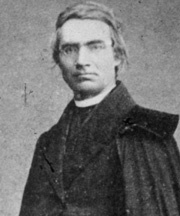
In a time and culture less secular than ours, it was customary to celebrate the liturgical feast days of saints with the focused enthusiasm and affection now largely reserved for birthdays.
At the University of Notre Dame in the mid-19th century, one such annual celebration occurred on Oct. 13 to mark the feast of an 11th century Saxon English king named Edward the Confessor. This became known as Founders Day, since the saint and the Universitys founder shared the same name.
As an anonymous student put it in the Oct. 17, 1868, edition of the Scholastic magazine:Every year, as royal old October with his mantle of crimson and gold marches along, crowned with the hazy light of the Indian summer sun, a sweet reminder of this great king and greater Saint is presented to every youth of Notre Dame University.On the thirteenth of this month we always celebrate his festival and honor him while making our joyful acknowledgement of indebtedness to Very Rev. Father General, the devout and worthy representative of St. Edward in our midst.
The rhetorically over stimulated Scholastic writer was referring, of course, to Notre Dames founder, Rev. Edward F. Sorin, C.S.C., and thejoyful acknowledgementdirected his way in 1868 was something any king, canonized or not, might envy.
It began on the evening of Oct. 12, with a pealing of the bells of the first Sacred Heart Church,the sweet chimes of Notre Dame,as the writer heard them,mingling their merry notes with the deep bass of the largest bell in the United States in the most gladdening strains of joy at the return of the anniversary.
From Sacred Heart, an honor guard of students, accompanied by the Notre Dame marching band, escorted Father Sorin to Washington Hall, where he and the entire student body (which could fit there in those days) were entertained by Notre Dames orchestra, playing, among other things, an allegro from Haydns 4th Symphony; RossinisAdina Oder der Kalif von Bagdadand something called theDoretten Polka.
In addition to the musical performances, the student Thespian Society presentedThe Ghost: A Comedy in Three Acts,and addresses praising the Universitys founder were given in Latin, Greek, French and German.
As an already amply entertained crowd emerged from Washington Hall, it found the campus decorated with Chinese paper lanterns and the night sky ablaze with fireworks.These were clearly the days before television and the Internet, when public entertainment was as lavish as student vocabulary.
On the morning of Oct. 13, Father Sorin presided and preached at a University-wide Mass, shared what the Scholastic calleda sumptuous dinnerwith the students and faculty and, as the Scholastic reporter wrote,the afternoon was spent in the innocent recreation afforded by rural sports and games of strength, swiftness and skill, Very Rev. Father Sorin being present and encouraging the emulous contestants.
The campus celebration of Saint Edwards feast will be celebrated a bit more quietly on campus this year than it was 140 years ago, but his most prominent local namesake will be no less affectionately honored.
Father Sorins most recent successor, Rev. John I. Jenkins, C.S.C., will preside and preach at Mass in the Basilica of the Sacred Heart at 5:15 p.m. Monday (Oct. 13).There will be no fireworks, no more sumptuous dinner than can be found in the campus dining halls that evening, no performances of Rossini.
What there will be, though, is the annual occasion of Founders Day, a time to remember with gratitude and even a little amazement the men and women who first formed and sustained a community of faith, learning and promise on a strenuous Indiana frontierthe people who carved the University of Notre Dame out of nearly nothing, who made and make it go.
TopicID: 29867